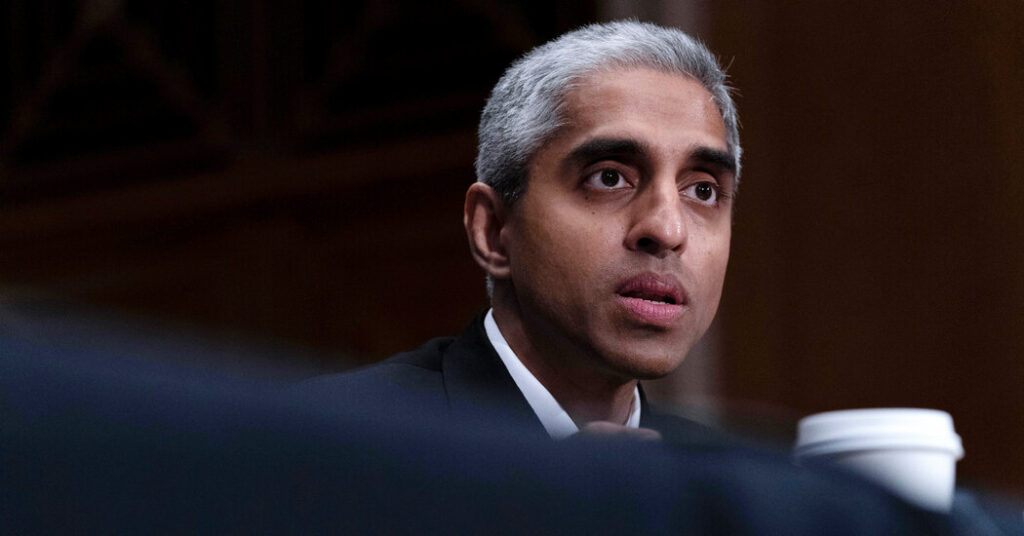U.S. Surgeon General Dr. Vivek Murthy on Tuesday declared gun violence in America a public health crisis and recommended a series of preventative measures that compare with past campaigns on smoking and road safety.
The move follows years of calls from health officials to view gun deaths in health terms, not politics.
The National Rifle Association strongly opposes the framework and has promoted legislation that would effectively end federal funding for gun violence research for a quarter century. The NRA also unsuccessfully lobbied against President Barack Obama's nomination of Dr. Mursi as Surgeon General in 2014, calling him a “serious threat to gun owners' rights.”
Dr. Murthy's 32-page recommendations call for increased funding for gun violence prevention research, advise health care providers to discuss gun storage with patients during routine visits, and recommend measures such as safe gun storage laws, universal background checks, “red flag” laws and an assault weapons ban.
“I've believed for a long time that this is a public health issue,” he said in an interview. “It's become politicized and polarized over time. But if we understand that this is a public health issue, I think we have an opportunity to move this out of the political realm and into the public health realm.”
But public health-based gun control has been an uphill battle in the United States. U.S. political parties are deadlocked over many of the measures the report recommended, such as banning assault weapons and requiring background checks for gun buyers. Experts estimate that there are 400 million guns in private hands, making it nearly impossible for the government to meaningfully restrict access to guns.
Gunshot wounds surpassed motor vehicle accidents as the leading cause of death among children and young people in the United States in 2020. The U.S. youth firearm death rate is about six times higher than Canada, about 23 times higher than Australia, and about 73 times higher than the United Kingdom, the Surgeon General's advisory said.
The past decade has seen a surge in new gun ownership and a significant increase in youth gun suicides, many of which were committed with guns owned by adults in the home. A study by the U.S. Centers for Disease Control and Prevention found that in cases of accidental gunfire deaths of children and adolescents, the guns used were stored loaded and unlocked.
“We now need to face the reality that this is a children's issue,” Dr Murthy said.
He added that he has spoken to students in urban and rural areas across the country who fear they will be shot in their neighborhoods or schools. “As a country, we are more united than we realize,” he said.
Federal reorganization in the 1960s stripped the Surgeon General's responsibilities largely to make him a powerful figure who communicates scientific findings to the public. In his second term as Surgeon General, Dr. Murthy has issued recommendations on youth mental health, loneliness and social media.
Warnings by the Surgeon General, such as his 1964 advisory on the health risks of smoking, were successful in shifting the public debate. After that announcement, Congress passed a resolution requiring health warnings to be printed on cigarette packs, and smoking began a 50-year decline. In 1964, about 42% of adults smoked daily, down to 11.5% in 2021.
Dr. Murthy said he believes public health campaigns against gun violence are a similar challenge, requiring a combination of education and awareness campaigns, cultural shifts and policies. “With tobacco, there was no single strategy that ultimately worked,” he said. “I'm thinking the same thing here.”
Jonathan M. Metzl, a professor of sociology and psychiatry at Vanderbilt University in Nashville, argued in a recent book that the public health strategies of “the wars on tobacco, the wars on seat belts, or other interests-versus-people conflicts of the last century” are inappropriate for a national debate over guns that is deeply rooted in political identity.
“In other words, framing gun violence as a public health 'epidemic' has failed to counter how a growing red-blue battle is being fought in an arena of increasingly lax gun control, with more and more civilians owning guns,” Metzl writes in his book, What Have We Become: Living and Dying in a Nation of Weapons.
But there are signs of movement. Following the 2018 Parkland, Florida, high school shooting that left 17 people dead, a wave of states have introduced red flag laws that allow authorities to temporarily confiscate firearms from people deemed a danger to themselves or others. Twenty-one states now have such laws.
Dr. Murthy said he hopes to see change spread from the medical field, where health care workers regularly talk to patients about safety issues like seat belts and swimming pools. Gun storage is likely to be one of those routine questions, he said.
“There are too many homes in America that have unlocked, loaded weapons, meaning they're not stored securely and pose a danger to not only their children but to others in the home,” he said. “That's where we can make a difference.”



